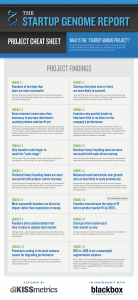Archive for Август, 2011
I’ve been always interested in an interaction of theory and practice especially in terms of innovations, technologies. As I guess that everyone has experienced that theory at times suggests those solutions that we couldn’t be put into practice. But today’s application is out of questions and criticism.
 Startup Genome Compass has been launched today and it’s good news as this service aimed to increase the success rate of startups and accelerate the pace of innovation globally. This fresh idea has been implemented due to a great teamwork of Silicon Valley developers: Max Marmer , Ertan Dogrultan, Ron Berman, Bjoern Lasse Herrmann as well as contributions from Steve Blank, Chuck Eesley, Neil Jacobstein and blackbox crew.
Startup Genome Compass has been launched today and it’s good news as this service aimed to increase the success rate of startups and accelerate the pace of innovation globally. This fresh idea has been implemented due to a great teamwork of Silicon Valley developers: Max Marmer , Ertan Dogrultan, Ron Berman, Bjoern Lasse Herrmann as well as contributions from Steve Blank, Chuck Eesley, Neil Jacobstein and blackbox crew.
«When we started the company in December we believed the answer to finding a scalable way to accelerate startups would be in finding a way to make startup accelerators more scalable. But by February our strategy had changed from a scientific approach to
entrepreneurship powered by people to an approach powered by software. Today we are excited to announce the release of such IT-solution» — developers report.
The Startup Compass is a benchmarking tool for founders to get regular feedback on the progress their making. The app automatically classifies startups by type and stage and compares them against startups in the same type and stage across more than 25 key performance indicators. In addition, the app also diagnoses startups for what our research team has found is the dominant cause of failure: premature scaling and generates a personalized startup genome report with information about how to improve.
Due to researchers findingsthe , more than90% of all startups fail, primarily due to self-destruction rather than competition. Many startups have trouble figuring out the right priorities to set and measuring their effectiveness once they do, almost always landing in the proverbial grey zone. Developers offered a simple benchmarking tool to reduce this grey zone by assessing a startup’s type and stage of development, and then comparing them to startups that are in the same type and stage on 25 key performance indicators.
 Innovators also believe that The Startup Compass would be able to cope with long-term objectives and enable the establishment of open dialog between entrepreneurs, investors and startups team. «In the future we will be able to assess what type and stage a startup is in with increasing precision and provide entrepreneurs with more and more information, resources, and tools they can use to move to the next stage of development.»
Innovators also believe that The Startup Compass would be able to cope with long-term objectives and enable the establishment of open dialog between entrepreneurs, investors and startups team. «In the future we will be able to assess what type and stage a startup is in with increasing precision and provide entrepreneurs with more and more information, resources, and tools they can use to move to the next stage of development.»
You could find the official report here.
More information about Startup Genome and its projects you could find here.
Before I’ve come up with the final idea what exactly I’m going to write about this time, a couple of weeks ago I came across the article that was called “Female encourages Web to grow.” That it is really so, according to the print edition “Internet in figures” 65% of web-users are women. There is no doubt that there are more women in social networks as they and we behave more active in them. And maybe that’s why among top-20 best Facebook pages, 11 of them belong to women.
Let me share with you TOP stories of female bloggers in Russian Web.
Let’s start from the best HR person in Russian Web — Alena Vladimirskaya . I’ve known Alena for a long time. She is a very smart, intelligent and hard-working person. While working for mail.ru, she was looking for employees for her company. Later she founded here own HR-agency that was promoted via social media only.
Vero4ka Polozkova is known as the most famous Russian Web poet. I remember the times when my colleagues read pieces from her poems, saying that “That girl is going to be the most popular poet in Russia.” And this turned to be true as Vera has 21 600 of web friends now. That definitely helped her to issue several books, win prestigious awards. And even I’m not fond of poetry, from time to time I like to check what is going on Vera blog, what are her thoughts today. continue reading
I was thinking a lot about how to write this post. And finally I decided to tell the world about the real people and real projects. As there is much information on modernization in theory, but only a few cases given in practice. Theoretical words and approaches in general doesn’t lead to progress unless they could lead to some changes in ourselves and in our business strategies.
I started working when I was 13, because I had always wanted to do my thing and live a full life. Most companies where I used to work, had about 60% of women among its employees. Maybe you are not aware of Russian staticts that states that there are 4 women on 1 men in our country, especially in such “historically women specializations” as accounting marketing, PR, advertising and others.
But it is always challenging for a woman to enter a business sector that isn’t conventional to her. I personally develop Gov 2.0: collect civic startups, learn about world experience and projects. It’s not a surprise for me that in the eyes of offices I often considered as a young blondie that speaks about innovations and knows about foreign achievements in eGov field. But I won’t argue that that it much easier to work and achieve results in IT-industry.
In 2008 when the crisis happened a lot women were fired, because they carried out minor positions, f.e. it wasn’t efficient to leave 3 PR-managers for one company. That led to the fact that people, most of which were women, from different parts of Russia were not able to find a job, some of them became mothers at that time. As a result in 2010 a substantial number of women in regions with high qualifications in PR, marketing, finance and accounting were out of work.
 Venture Business News published an article with my thoughts and ideas to entrepreneurs and market.
Venture Business News published an article with my thoughts and ideas to entrepreneurs and market.
Most of my friends are convinced that the investor is a person who is not able to create the project. I do not agree with them. Startups offer a non-working ideas to the market, running within a narrow range of investors. Obviously they are denied be VCs without any advice.
…
You can read the full article there I also placed a google-translated link for you there
 Today rbth.ru published great article on how Startup-Women idea ‘s been created and ow Russian women a conquering RuNet. We have a lot of ideas that are waiting its realization and we will make it together.
Today rbth.ru published great article on how Startup-Women idea ‘s been created and ow Russian women a conquering RuNet. We have a lot of ideas that are waiting its realization and we will make it together.
Young Russian women find Internet start-ups an interesting prospect, but are they willing to face the realities of running a small business?
You can read the full article there.
 I have recently published an open letter of our Startupafisha to the whole startup-community. I’m offering to discuss the problem of start-up market in Russia and seek for possible solutions. We’ve created a set of new tools and services that resolves some important issues faced by Russian startup-community. Therefore, I’m offering to solve problems together, when you know the opinion of market professionals and it’s active players you can do and create much more.
I have recently published an open letter of our Startupafisha to the whole startup-community. I’m offering to discuss the problem of start-up market in Russia and seek for possible solutions. We’ve created a set of new tools and services that resolves some important issues faced by Russian startup-community. Therefore, I’m offering to solve problems together, when you know the opinion of market professionals and it’s active players you can do and create much more.
The «StartupAfisha» has been launched in December 2010. It was a public calendar of all events for entrepreneurs, investors and members of Russian Startup Community. Thouh the idea was good, the project was not really a win-win for some reason, most of people began to copy calendars, but not sharing the audience, and stuck in its own traffic. The new version of StartupAfisha — is a set of services and tools that help members of the IT market to solve many important problems.
Here is the link to my open letter to the community. For my foreign friends I suggest to use the google-translated link




